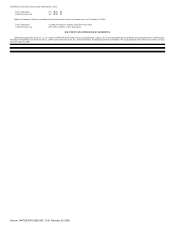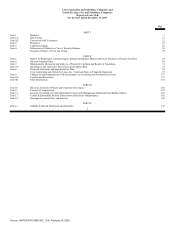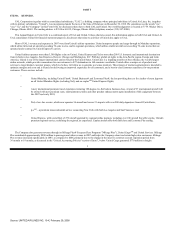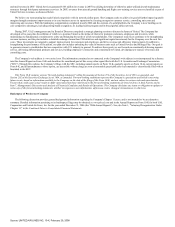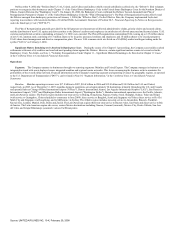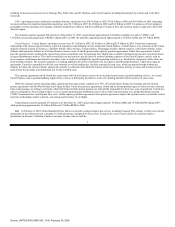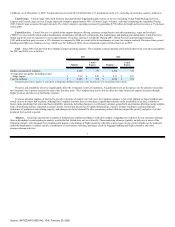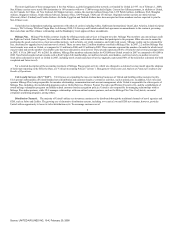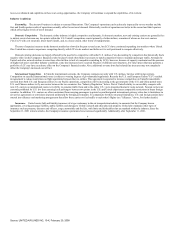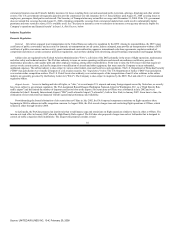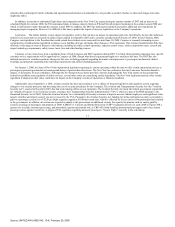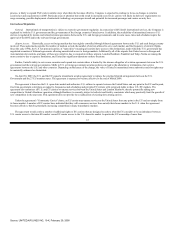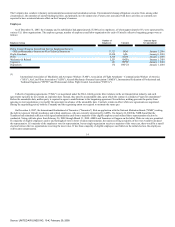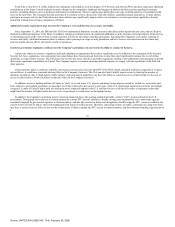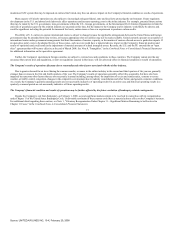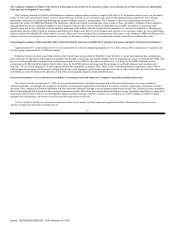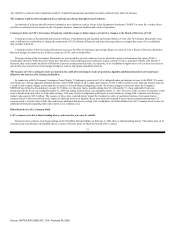United Airlines 2007 Annual Report Download - page 12
Download and view the complete annual report
Please find page 12 of the 2007 United Airlines annual report below. You can navigate through the pages in the report by either clicking on the pages listed below, or by using the keyword search tool below to find specific information within the annual report.
elements that could impact United's schedule and operational performance at LaGuardia. It is not possible to predict whether or when such longer-term rules
might take effect.
In addition, in reaction to substantial flight delays and congestion in the New York City region during the summer months of 2007 and an increase in
scheduled flights for summer 2008, the FAA announced plans to impose capacity limits at JFK and Newark airports beginning in the summer season 2008 and
which would remain in effect through the summer season 2009. In addition, the DOT has indicated an intention to propose additional new regulations for
managing airport congestion. However it is difficult at this time to predict the impact of any new legislation on the Company's operations.
Legislation. The airline industry is also subject to legislative activity that can have an impact on operations and costs. Specifically, the law that authorizes
federal excise taxes and fees assessed on airline tickets expired in September 2007 and is currently extended until February 29, 2008. In late February 2008,
Congress sent legislation to the President that would extend these federal excise taxes and fees until June 30, 2008. Congress is currently attempting to pass
comprehensive reauthorization legislation to impose a new funding structure and make other changes to FAA operations. Past aviation reauthorization bills have
affected a wide range of areas of interest to the industry, including air traffic control operations, capacity control issues, airline competition issues, aircraft and
airport technology requirements, safety issues, taxes, fees and other funding sources.
Customer service issues have been a significant focus of both Congress and DOT regulators during 2007. It is likely that legislation imposing more specific
customer service requirements will be approved by Congress in 2008, though what those requirements might be is unclear at this time. The DOT has also
initiated processes to consider regulatory changes in this area, including proposals regarding treatment of and payments to passengers involuntarily denied
boarding, and proposals regarding delay reporting requirements and airline scheduling practices.
On January 1, 2008, the State of New York implemented legislation requiring air carriers operating within the state to offer certain enumerated services to
passengers experiencing extended on-board ground delays of greater than three hours. The New York law authorizes the state Consumer Protection Board to
impose civil penalties for non-compliance. Although the Air Transport Association has filed a lawsuit challenging the New York statute on the grounds that
federal law prohibits state regulation of airline services, several other states are considering similar legislation. The New York legislation and any other similar
legislation if adopted in other states could have an impact on the Company's results of operations or financial condition.
Additionally, since September 11, 2001, aviation security has been and continues to be a subject of frequent legislative and regulatory action, requiring
changes to our security processes and increasing the cost of security procedures for the Company. The Aviation and Transportation Security Act (the "Aviation
Security Act"), enacted in November 2001, has had wide-ranging effects on our operations. The Aviation Security Act made the federal government responsible
for virtually all aspects of civil aviation security, creating a new Transportation Security Administration ("TSA"), which is a part of the DHS pursuant to the
Homeland Security Act of 2002. Under the Aviation Security Act, substantially all security screeners at airports are now federal employees and significant other
aspects of airline and airport security are now overseen by the TSA. Pursuant to the Aviation Security Act, funding for airline and airport security is provided in
part by a passenger security fee of $2.50 per flight segment (capped at $10.00 per round trip), which is collected by the air carriers from passengers and remitted
to the government. In addition, air carriers are required to submit to the government an additional security fee equal to the amount each air carrier paid for
security screening of passengers and property in 2000. A DHS/U.S. Customs and Border Protection ("CBP") regulation effective in early 2008 will give CBP a
greater role in airline customer processing, and potentially a greater operational role, as CBP will forbid boarding international passengers until it has cleared
passenger names against watch lists. A proposed TSA regulation regarding domestic passengers, "Secure Flight," currently in the rulemaking
11
Source: UNITED AIR LINES INC, 10-K, February 29, 2008


